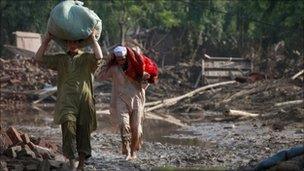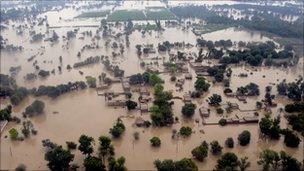Pakistan flood: UK charities rush to help
- Published

The disaster has already claimed the lives of 1,600 people and affected over four million
As the Disasters Emergency Committee launches an emergency appeal to raise funds for victims of the devastating floods in Pakistan, British charities are scrambling to get aid to the worst affected regions.
The UN says Pakistan's worst flooding in nearly a century has now affected more than four million people and left at least 1,600 dead.
Charities have been quick to send supplies and emergency response teams.
But with fresh flood warnings and more rain forecast - and thousands struggling with shortages of food, clean water, shelter and medicine - UK aid agencies say the situation on the ground is desperate.
Patrick Fuller, from the British Red Cross, has been based in Islamabad for the past few days and visited many of the hardest-hit provinces.
He said the worst areas were "totally dependent" on outside help, and the International Red Cross was working with local partners to get a whole package of aid, such as tents, blankets, stoves and cooking pots, to about 35,000 families.
"In Nowshera 80% of homes have been badly damaged or destroyed, all the mud-brick houses have been washed away.
"In the most remote areas - where roads are cut off - donkeys are making eight-hour hikes to reach people.
"We are trying to move people into temporary camps - giving them timber, roofing sheets and basic shelter - but there is the added complication that many are reluctant to leave whatever homes they have left," he said.
'Lives swept away'
He said the charity had distributed more than 10,000 food packs and 1,000 tents across the affected areas so far, but figures were constantly changing.

Floods in the north-west of Pakistan have submerged entire villages
Health, water and sanitation were also major concerns and the Red Cross was setting up mobile medical teams, he said.
"Many people rely on open wells, which have been contaminated, so access to clean water is a problem. We are worried about communicable diseases, like respiratory infections, skin diseases, diarrhoea," he said.
"The longer people are living in these conditions, the higher their vulnerability."
But Mr Fuller said although the immediate emergency needs were focused on people who had "had their lives swept away in seconds", the Red Cross anticipated the relief effort would last six months.
"As so often is the case, the worst affected are the poorest.
"They will have lost their homes and livelihoods. Many will have worked as day labourers, so they will have to start again from scratch," he said.
It is a view shared by Sean Kenny, head of communications at Action Aid, who arrived in Pakistan from Britain on Thursday morning.
He said he was making his way straight to Kota Addu, in south Punjab, where there were likely to be "serious long-term effects" because the area had effectively been turned into a huge lake.
'Deteriorating'
"It's a very poor area, in the middle of desert - a bit like the Nile. But it's the only place where there is agriculture in the area, so with all the crops damaged and hundreds of villages affected, food will be a big problem."
He said Action Aid planned on providing food, livestock fodder and mosquito nets to over a thousand households in the area.
The charity said medical centres were also a priority.
"There are lots of snakes, so there is a huge risk of snake bites, as well as water-borne diseases such as dysentery and cholera," he said.
The DEC - an umbrella organisation of 13 UK humanitarian aid agencies - said its aid had managed to reach 300,000 survivors, with many UK charities distributing food, water purification tablets, shelter, medicine and hygiene kits by raft, boat and donkey.
But it said it "urgently" needed the UK public's help to save more lives.
Chief executive Brendan Gormley said: "These devastating floods have left millions fighting to survive with little food, clean water or shelter.
"As monsoon rains continue unabated, it is clear that the situation is deteriorating and the speed of our response is vital."
- Published5 August 2010
- Published4 August 2010